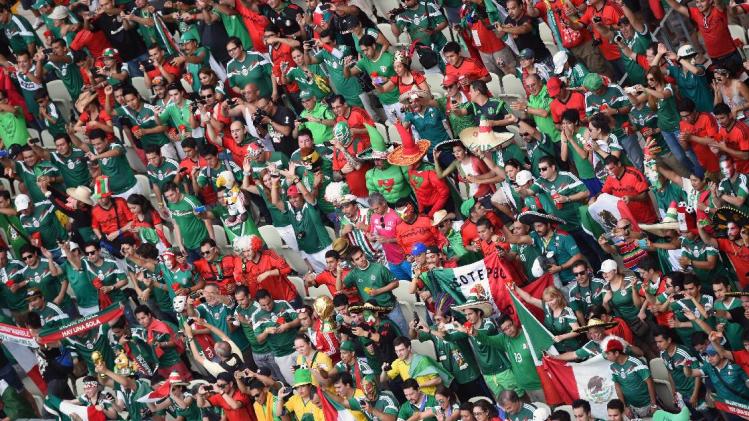FIFA is investigating multiple reports of racism and homophobia from fans during the first circuit of matches in the group stage of the 2014 World Cup.
The chief culprit looks to be certain fans of Mexico, who were reported to have used a homophobic slur in the team’s opening match against Cameroon. In Mexico’s second match, against Brazil, there were reports of homophobic slurs by both sets of fans.
The anti-discrimination Fare network, which made the reports to FIFA on Thursday, also noted neo-Nazi signs at matches involving Russia and Croatia.
None of this is surprising. Soccer is notorious for subhuman fan behavior, whether it’s name-calling or throwing objects. Mario Balotelli, Italy’s superstar forward, has been one of the sport’s most well-known victims. Just last month, Balotelli was targeted by racial insults at a national training camp – by Italy fans. He has been bombarded and at times overwhelmed by horrific slurs in multiple countries.
What may be surprising is what happens next. FIFA has newer, bolder rules for dealing with this, and it may use them.
The question is: how?
One option is forcing a match to be played behind closed doors, but that’s extremely unlikely at an event like the World Cup. The more feasible choice is also the more drastic: penalizing a team with either a points deduction or even a ban from qualifying for the next World Cup.
This gets into a tricky realm, because the players themselves didn’t do anything wrong, and yet they could be punished for a few hateful fans. If it’s something like the Balotelli instance, should his own team get docked a point because his own fans lobbed slurs at him? There have also been reports of rival fans in other tournaments posing as another team’s backers and screaming epithets to get that team into trouble.
Yet the new rules are in place for a reason, and a very good one: this behavior is a stain on the sport. It has to be rooted out, and FIFA’s image – sullied though it is – depends on aggressive action here. Executives have already admitted financial sanctions won’t work.
“FIFA has some strong regulations in place and we hope they use them,” Piara Powar of Fare told the Daily Telegraph. “Zero tolerance is the approach set out. It is what is required here.”
Zero tolerance should be the approach, especially in the case of the Russian and Croatian fans. Both groups were sanctioned for similar behavior two years ago in the European Championships. Russia was already docked points during qualifying for the 2014 tournament.
Russia has already qualified for the 2018 World Cup, since the host is exempt, but any kind of sanction would send a message around the globe that repeated offensive behavior has heavy consequences. The zero tolerance threshold has long since passed for these two fan bases. Yaya Toure of Ivory Coast threatened that black players could boycott the 2018 World Cup if nothing is done about racism he and others have faced in Russia.
“It seems that fans of some of these countries will take their hatred halfway around the world,” Power said. “These images need to be acted on urgently.”
FIFA now has the rules in place. The fan bases and the nations know this kind of behavior is abhorrent. There is no longer any leeway, and there should no longer be any leniency.
The world is watching.





